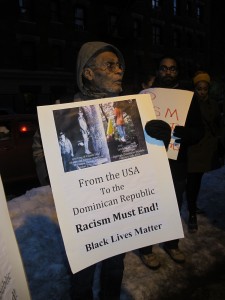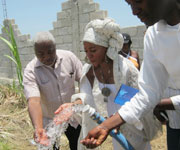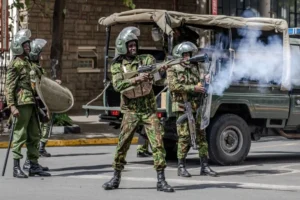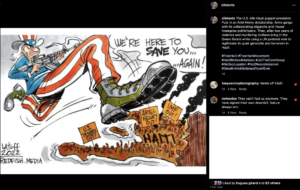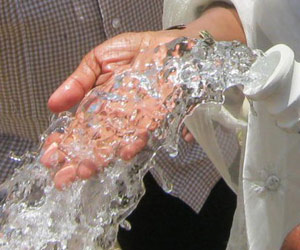Brief Summary: In 1937, in a systematic campaign of extermination, the Dominican Republic slaughtered 30,000 Haitians in only five days. The Haitians were massacred in the most horrific ways by Dominican soldiers and civilians wielding machetes, bayonets and rifles.
No Haitian or dark-skinned Dominican suspected of being Haitian was spared — women and children were as mercilessly slaughtered as the men-folk.- It was Trujillo’s river massacre. Ironically, like many Dominicans, Trujillos was of Haitian descent. He wore pancake make-up to lighten the traces of color his Haitian grandmother’s blood had left in his skin.
In 2013, the Dominican authorities passed a law that de-nationalized Dominicans of Haitian descent going back to 1929. This emboldened more anti-Haiti violence reminiscent of 1937. A series of DR public decapitations, beatings and lynchings of Haitians heightens the DR’s brutal violence against Haitians. With the US/UN leading the way in this, the DR perpetrators realize they can get away with killing Haitians, so they are having a field day hurting, lynching, deporting or stealing from Haitians to ride out the world economic down turn. On February 25, 2015 Haitians in Haiti hold a protest to send the message to the Dominican torturers that the world will not tolerate another Haitian holocaust in the Dominican Republic as happened in 1937.
The Haiti protestors urged Haitians to return home and for the Haiti government to stop its billion dollar imports from the DR and invest that money in the repatriated Haitians and putting Haitian to work on local Haiti agriculture, infrastructure and construction.
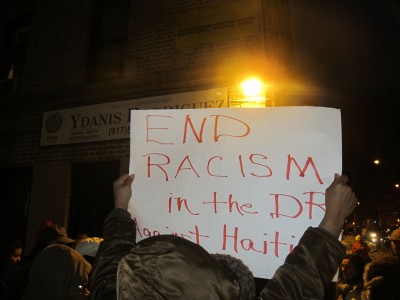
End Racism in the DR. Black lives matter. Justice for Tulile, Feb. 12, 2015. Extremists in the DR, most with African blood, are beating and killing Haitians. They’ve been taught that being Dominican means they’re the descendants of the Spanish enslavers and that this makes them BETTER than the people who abolished slavery.
10,000 Haitians march in Haiti to protest Dominican hanging of Henry Claude Jean, DR racism and mistreatment of Haitians in DR.
(Check back often for updates)
Haiti, Anti-Dominican March
After years of enduring humiliations from the Dominican Republic, on Wednesday, February 25, 2015, more than ten thousand Haitians finally took to the streets to protest the wave of anti-Haitian atrocities in the Dominican Republic, including the hanging death of Henry Jean Claude.
The protest was put together by a group of Haiti artists, lawyers and civil society groups. They marched to the Dominican Republic’s consulate in Haiti to protest the killing, institutionalized mistreatment of Haitians and the state-sponsored racism of the DR, and to urge the Haiti government to embargo and stop all trade and commercial activities with the DR.
The DR responded by denying the charges, indicating that the systematic DR mistreatment and killings of Haitians were isolated incidents. This is par for the course in a country where Dominican journalists who question the wholesale de-nationalization of Dominicans of Haiti ancestry are uniformly ostracized and receive death threats. Dominican Republic authorities are so complicit in the state violence, the ministry of culture defends the use of KKK costumes in DR national parades. On February 19, 2015, a week after the public hanging of Henry Jean Claude, a Haitian name Ti Louis was found savagely beheaded in the Dominican Republic. Two Dominican National police officers and four civilians were arrested for robbing the home of Fritz Cineas, Haiti’s Ambassador to the Dominican Republic. The DR protested the Haiti march saying it had been “more than patient” with Haitians charging them of racism! Their hollow denials continue, while video after video of one heartless Dominican thug group after another, beating up, lynching or decapitating Haitians keep being uploaded to youtube.
I could not stop crying when I saw this one of Dominicans publicly beating a Haitian they’d bound to a street pole. Cars go by. No one helps. It twists my stomach. So much pain and anger heaped on a people because they were the first to put liberty into application against the enslaving Euro-US world powers.
Dominicans publicly beating a Haitian they’d bound to a street pole
The world seems unfazed. The savagery against Haitians is led by the United Nations and US-Euro militaries occupying Haiti by force for over 11-years. They embolden these depravities. (See, also Massacre River: The Dominican Republic Genocide of over 30,000 Haitians in 1937.)
The puppet Haiti government for its part, is so out of sync with the people of Haiti’s deep grief at the inhuman Dominican treatment of Haitians that it nearly apologized for their protest. As usual, it did not meaningfully stand with its people, did not focus on the largely peaceful protests, but the foreigners’ feelings. Haiti’s unpopular US-puppet government replaced Fritz Cineas with a new ambassador to the DR and mostly “condemned the violation and assault against Dominican Consulate and flag by Haitian protesters.”
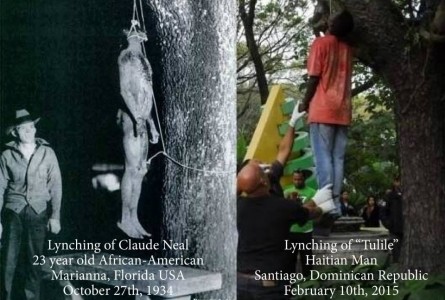
A Haitian named Tulile, a humble shoe shine worker, was found hanging in Santiago Park, DR. His hand and foot tied together. Feb 10, 2015
In its statement regarding the protestors’ demands, the Haiti government further maintained:
“About repeated calls by several sectors urging the Haitian government to close the Haitian side of the border to goods coming from the Dominican Republic, Brutus recognized that the country is “unfortunately very dependent on the Dominican republic for a number of things.”
“Until we can change the pattern, we need to consider a number of parameters. We are not sure now whether a decision to close the border would be supported by the population that is difficultly dealing with day-to-day life,” he stated. “We cannot take measures based only on emotions. Our actions should be well examined and weighed, he added. “
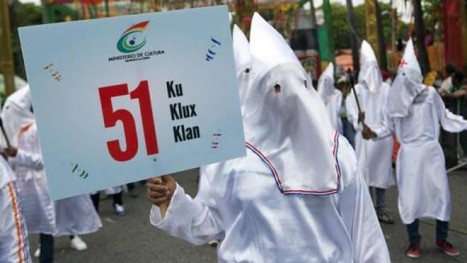
Dominican Republic hollow denials. “We’re Not Racists: Dominican Government Defends Use Of KKK Costumes In Parade“, March 2014
The Haiti government shows how lacking it is in the art of governance and leveraging power. It said that it cannot boycott the DR because Haiti is “unfortunately very dependent on the Dominican Republic for a number of things.” This is disgraceful for a government to actually utter. What’s its purpose? Dependency doesn”t help Haiti local development, only DR local development. To protect and expand its own market is the job of the Haiti government. But its doing that job for the DR at the expense of Haiti development and allowing its people to suffer unspeakable indignities, beatings, brutality and racism.
Contrary to the position of the Haiti government, it is Haiti that is the Dominican Republic’s most important market. 90% of the agricultural workers in the Dominican Republic are Haitian. If Haiti brought them back to do agriculture in Haiti, grow eggs, rice, and all other products that Haiti imports from the DR that is created by Haitians in the DR, we”d have a local economy and no more mistreatment of Haitians in the Dominican Republic. Let the DR people do their own agriculture and manufacturing, value Haitian labor.
“Dominican exports to Haitian have grown considerably, rising from US$647.3 million in 2009 to US$869.23 million in 2010 and US$1.018 million in 2011.”
“I get everything at the Haiti-Dominican Republic: carrots, squash, eggplant, cabbage, peppers, eggs, salami,” explained a merchant at the Croix des Bossales marketplace, her stand teeming with goods. “The border is what feeds us.”— Haiti-Dominican Republic Trade: Exports or Exploits?
It’s time for the Haiti government to get in sync with its people, recall its ambassador, stop all trade with the DR, close the borders and repatriate the 90% of agricultural workers in the Dominican Republic, the construction workers and others to stop further DR mistreatment. Haitians of conscience have encouraged boycotting DR products, services and tourism since the 2013 court ruling making over 220,000 Dominicans of Haitian descent stateless.
Haiti Never Occupied the Dominican Republic: Time to Put The Myth Aside
In terms of our history, the Dominicans have re-written history and forgotten we are one people, colonized, one side by the French, one side by the Spanish before the African warriors liberated the entire island. That’s the truth. The cowardly Haiti government in power won’t utter it. To the DR constant charge that it’s afraid of Haiti taking it over because Haiti once occupied the DR, our response, on behalf of the Haiti nation and Ancestors, is: How can one occupy a country that didn’t exist? The whole island was Ayiti. Ayiti was liberated from Europeans chattel enslavement by the Haiti warriors led by Jean Jacques, et al.. Spain returned to the East side of the island. France was satisfied with the gross Independent Debt.
Haiti’s masses are not interested in re-uniting either with the French nor Spanish colonialists or their US conquerors. Haiti was born in the fire of abolishing Euro enslavement and is the rebel since before 1806. Haiti has lived through one hundred years of resistance since the US first occupied Haiti. Faced and survived, though in extreme poverty, US imperialism in all its faces. That re-enslavement is currently outsourced to the UN mercenary guns and the NGO invasion. Haiti fights alone, with only a few authentic champions such as the honorable St. Vincent Prime Minister Ralph Gonsalves. Whereas, the DR like the rest of the colonized Caribbean islands are mostly of a totally assimilated mindset, so much so they’re victims making Haitians within their borders, victims. The self-anointed knight, the hereditary knight that only victimizes and steals from the poor is an established European way of being.
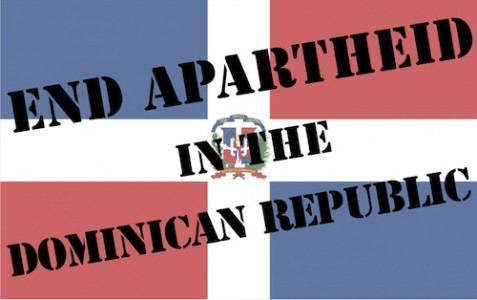
End legal apartheid and racism in the Dominican Republic. Boycott DR tourism, trade, services and products.
|
April, 2015 – 300 Haitians forcibly deported without due process in DR: Racist attacks in Dominican Republic
In this widely circulated video of the Moca incident, a Haitian woman is thrown to the ground by racist thugs, Haitians are beaten, a young man’s dreads are cut by a mob and a home is completely trashed. Since the 2013 apartheid ruling, a new wave of racist attacks on Haitians and Dominicans of Haitian descent inside the Dominican Republic unrolled. After the lynching of Henry Claude Jean in Feb 2015, there occurred the racist expulsion of 300 Haitians and Haitians of Dominican origin in the Ortega community in Moca. All Haitians in Moca were blamed for the April 8 death of a motorcyclist, Carlos Jose Gomez Nunez, and driven out of town with sticks and clubs by a violent mob in the Dominican Republic. *** |
To help sustain this work become a paid monthly subscriber at $12 per month. Your support is much appreciated. Thank you.
***
Haiti Never Occupied the Dominican Republic: Time to Put The Myth AsideDR Police arrest 2 agents in theft at Haiti ambassador’s residence, Feb 16, 2015
Massacre River: The Dominican Republic Genocide of over 30,000 Haitians in 1937
Parsley Massacre in 1937.
Protest at consulate stuns Dominican Republic-Haiti ties
Haitian Protesters Decry Dominican Treatment of Countrymen
We’re Not Racists: Dominican Government Defends Use Of KKK Costumes In Parade
Lynchings, citizenship issues are behind tensions between Haiti and the Dominican Republic
Haïti ne fera pas d’excuses, Nouvelise, Feb. 21, 2015
Haitians want their envoy in Dominican Republic out
Une journaliste dominicaine frappée d”apatridie
***
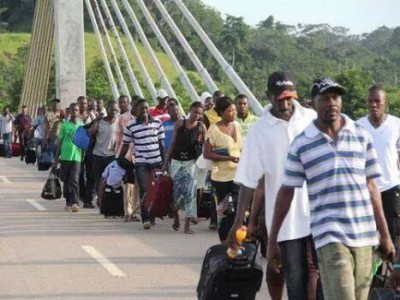
Haitians escaping the Jim Crow laws and lynching in the DR. Since the 2013 denationalization ruling, Haitians have chosen to leave the Dominican Republic in droves. Those who can’t are getting hurt
A Barbaric Lynching in the Dominican Republic
http://bit.ly/1yvaCVl
***
Haitian Protesters Decry Dominican Treatment of Countrymen
PORT-AU-PRINCE, Haiti — Feb 25, 2015, 7:37 PM ET
Associated Press
About 10,000 people marched in Haiti’s capital Wednesday to protest what they say is chronic mistreatment of their countrymen in the neighboring Dominican Republic, where many Haitians have long lived in the shadows.
The demonstration was mostly peaceful, with young and old protesters waving Haitian flags and demanding that Dominicans respect the human rights of Haitians. It was organized by an association of lawyers and civil society groups.
When the crowd got to the Dominican consulate, one man managed to climb up on the roof and rip down a Dominican flag. The flag was doused with fuel and burned by the cheering crowd. Some protesters briefly chased a woman they believed to be Dominican.
There were no reports of arrests by the Haitian National Police. Some of the officers monitoring the protest also held Haitian flags.
The march came about two weeks after a shoe shiner of Haitian descent was found hanging from a tree in a square in the Dominican city of Santiago. Haitians believe Henry Claude Jean was the victim of racist violence, but Dominican investigators say it appeared he was killed by other Haitians.
No one knows exactly how many Haitian migrants live in the Dominican Republic, but the United Nations has estimated there may be as many as 500,000. The two countries share the Caribbean island of Hispaniola and a porous border.
Comparatively much wealthier than its neighbor, the Dominican Republic has long been a magnet for low-wage workers from Haiti but it has been seeking to limit unregulated, cross-border traffic in recent years.
In 2013, the Dominican Supreme Court ruled that people born in the country to non-citizens were not automatically entitled to citizenship. It was a retroactive ruling that went back to 1929 and left many people who had thought of themselves as Dominican in legal limbo.
Amid international pressure, the Dominican government decided that people affected by the ruling could apply for citizenship after they obtained birth certificates by a Feb. 1 deadline.
Add a comment:
Powered by Facebook Comments

